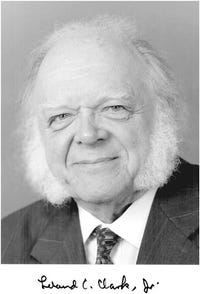More Legendary Medical Device Inventors
February 25, 2016
We did a lot of research when creating our roundup of the top 50 medical device inventors of all time, but, no single list could do justice to all of the contributions made by medical device pioneers. Based on your feedback, we have started a roundup of some of the innovators that weren't included in the original list and ask for your help in identifying others in the survey below.
Brian Buntz
Rox Anderson, MD (1950-)
Invented laser hair removal, fractional lasers for skin rejuvenation and scar treatment, and cryolipolysis among other important medical innovations. Each of these inventions became a common tool in the fields of laser and aesthetic medicine. He has authored more than 300 research papers related to skin optics, lasers, and skin diseases.
Arnold O. Beckman, PhD (1900-2004)
The chemist Beckman invented the pH meter and the DU Spectrophotometer, which has been named "probably the most important instrument ever developed towards the advancement of bioscience" by the Journal of Biological Chemistry. He also invented the first stat routine chemistry analyzer, the ASTRA. Beckman Instruments acquired Coulter Corp. in 1998, merging two great companies founded by inventive geniuses. Both Beckman and Wallace Coulter were inducted into the U.S. National Inventors Hall of Fame.
Leland Clark, Jr. (1918-2005) Clark (pictured right) invented a dedicated polarographic sensor that facilitates the measurement of oxygen in the blood. For decades, it has been referred to as "The Clark electrode" and is incorporated in blood gas analyzers in daily use throughout the world. He also helped develop the first partial heart-lung bypass machine used on a human patient, fluorocarbon liquid-based liquid breathing, fluorocarbon-based artificial blood, and is known as the father of biosensors, including glucose and lactate sensors for diabetes and critical care medicine respectively.
Clark (pictured right) invented a dedicated polarographic sensor that facilitates the measurement of oxygen in the blood. For decades, it has been referred to as "The Clark electrode" and is incorporated in blood gas analyzers in daily use throughout the world. He also helped develop the first partial heart-lung bypass machine used on a human patient, fluorocarbon liquid-based liquid breathing, fluorocarbon-based artificial blood, and is known as the father of biosensors, including glucose and lactate sensors for diabetes and critical care medicine respectively.
Graeme M. Clark (1935-)
The Australian doctor Graeme Milbourne Clark played a crucial role in the development of the cochlear implant.
Wallace Coulter (1913- 1998)
Wallace Coulter developed the Coulter Principle, which has been widely used for counting and sizing particles within fluids, enabling the complete blood count test. Today, billions of blood vials are tested using his technique--the most common medical diagnostic test. The electrical engineer Coulter holds 85 patents. His surname is honored in the name of the lab diagnostic firm Beckman Coulter.
Ralph Cloward (1998-2000)
Dubbed the "Michelangelo of Neurosurgery," Ralph Bingham Cloward helped establish posterior lumbar interbody fusion and anterior cervical discectomy and fusion. He created more than 100 medical instruments.
Aaron V. Kaplan (1957-)
The Dartmouth medical device entrepreneur Aaron Kaplan has played an important role in the development of a number of medical device companies such as Tryton Medical, LocalMed, and Perclose (now an Abbott division). At Tryton, Kaplan initiated the design efforts which lead to the development of a dedicated coronary stent to treat branch point lesions. He has authored more than 40 U.S. patents.
Alfred Mann (1925-2016)
The engineer Mann become one of the most prolific entrepreneurs in the medical device field, founding nearly 20 medtech companies and playing a role in the development of the rechargeable pacemaker and an artificial retina that enables the blind to see.
William New, MD, Ph.D. (1944-)
New helped pioneered the pulse oximeter and founded the company Nellcor with Jack Lloyd and James Corman. He also co-founded Natus Medical Inc.
Juan Carlos Parodi (1942-)
The U.S. vascular surgeon Parodi was a pioneer in minimally invasive aortic aneurysm surgery and helped establish endovascular repairs of the aorta.
Sir Harold Ridley (1906-2001)
Ridley was an English ophthalmologist who helped develop the first intraocular lens and intraocular lens surgery. In 2001, Telegraph estimated that his work had helped save the vision of some 200 million people internationally.
Create your own user feedback survey
Learn more about cutting-edge medical devices at BIOMEDevice Boston, April 13-14, 2016. |
About the Author(s)
You May Also Like


